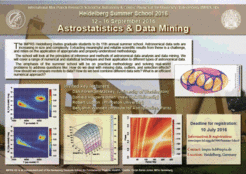Astrostatistics & Data Mining
The 11th Heidelberg Summer School took place September 12-16, 2016 at the "Max-Planck-Haus" (Max Planck House) in Heidelberg, Germany.
Organisation:
IMPRS for Astronomy and Cosmic Physics at the University of Heidelberg:
Max Planck Institute for Astronomy, Max Planck Institute for Nuclear Physics, Astronomisches Rechen-Institut, Institute for Theoretical Astrophysics, Landessternwarte Koenigstuhl, and Heidelberg Institute for Theoretical Studies.
Scientific organizing committee: Coryn Bailer-Jones (MPIA, Heidelberg).
Invited lecturers:
Dan Foreman-Mackey (University of Washington)
Daniela Huppenkothen (New York University)
Robert Lupton (Princeton University)
Benjamin Wandelt (Institute for Astrophysics, Paris)
Scope of the School:
Astronomical data sets are increasing in size and complexity. Extracting meaningful and reliable scientific results from these is a challenge, and relies on the application of appropriate and properly-understood methodology.
The school looked at the principles of inference and methods of astronomical data analysis and data mining, also covering a range of numerical and statistical techniques and their application to different types of astronomical data.
The emphasis was on practical methodology and solving real-world problems to address questions like: How do we deal with missing data, outliers, and selection effects? How should we compare models to data? How do we best combine different data sets? What is an efficient numerical approach? Topics that have been covered include:
- time series analysis, including quasi-periodicity and stochastic processes
- low photon count data
- multi-dimensional interpolation
- image processing: optimal addition and subtraction
- non-Gaussian and correlated noise
- Bayesian model comparison vs. orthodox hypothesis testing
- MCMC methods
- hierarchical models
- parameter estimation in high dimensional problems
- novelty detection
- handling and visualizing large or multi-dimensional data sets
Program and participants
Have a look to the school program and the list of participants


